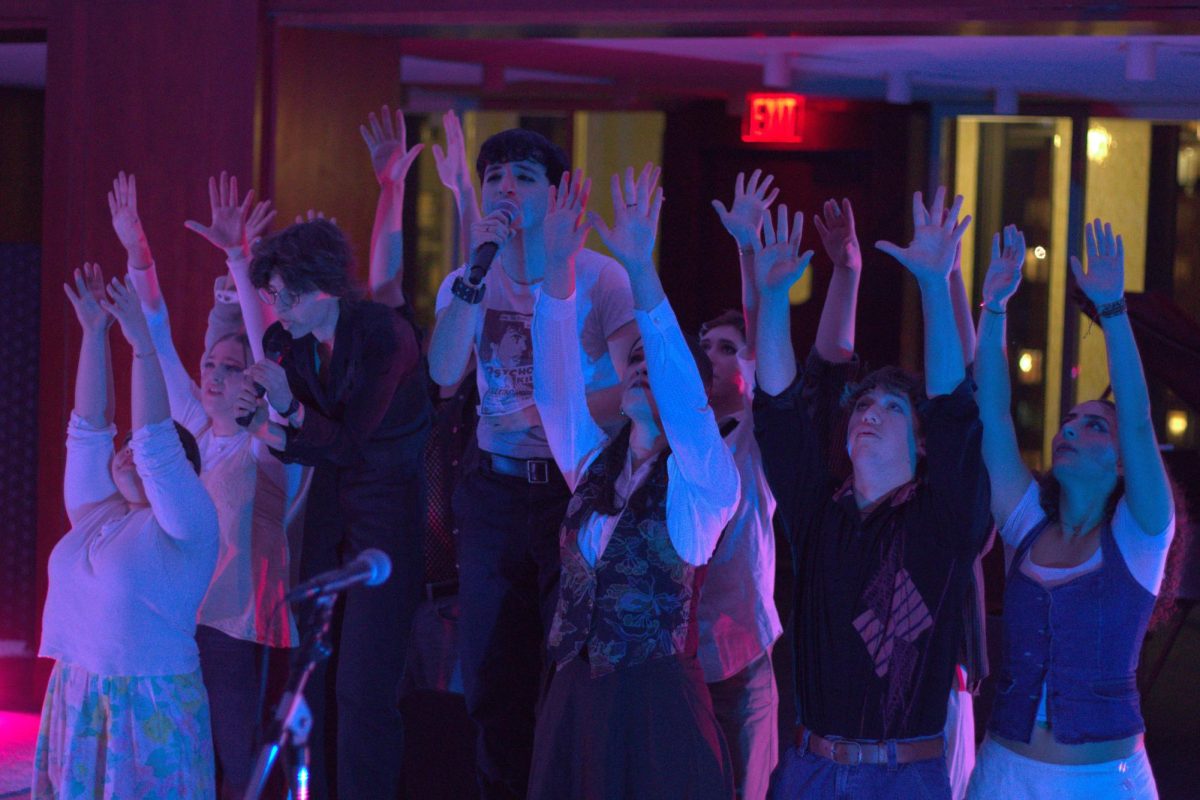On Nov. 14 and 15, Fordham Lincoln Center’s musical theatre club Splinter Group performed “Spring Awakening,” a coming-of-age punk rock musical set in 19th-century Germany. The show covers the yearnings of teenagers growing up in a society that wants to suppress their longings.
“I would say that instantly when I read the script and listened to the music I was hooked on the show,” Olivera Darden, Fordham College at Lincoln Center (FCLC) ’25, the director of “Spring Awakening” and president of Splinter Group, said.
The songs in the musical take the audience outside of the setting and give a deeper look into these universal truths and feelings that the characters experience within the show rather than furthering the plot. The themes of the show include censorship, sexuality, religion and abuse. How did Splinter’s cast and production team plan on grappling with these mature themes on stage and in the rehearsal room?
The original production of “Spring Awakening” stunned audiences with the balance between the portrayal of intense emotions and graphic scenes. Splinter worked with the Office of Student Involvement to ensure that the production followed Fordham’s guidelines on graphic content and protects the integrity of the actors.
“We’re bridging a gap between those guidelines and then also an authentic performance, where we’re doing justice to the content and the audience in putting on such an important work where the intimacy and graphic content are essential to the plot.” Alex Vargas, FCLC ’26
“We’ve had very tremendous support from the Office of Student Involvement but that was my first question. How much are we going to have to censor?” Hayes Hunter, FCLC ’27, intimacy coordinator of “Spring Awakening,” said.
Hunter was trained in intimacy coordination at her high school, which was near the University of North Carolina at Chapel Hill (UNC). David Navalinsky, the director of Undergraduate Studies in the Dramatic Art Department at UNC, gave lessons at Hunter’s high school defining intimacy coordination and how to teach intimacy practices. Hunter said that her experience in intimacy coordination and acting aptly prepared her for her newest role within the Splinter Group. Her job is integral to the safety and comfort of the students. Also, her responsibility is to maintain the authenticity of the text through these intimacy practices
One of the main characters of the show is Melchoir. Alex Vargas, FCLC ’26, played Melchoir, a teenage boy that rejects all religious influence and explores his sexuality to the distress of his peer, Moritz and Wendla. Vargas said that the balance between the script’s integrity and the actors’ comfort made “Spring Awakening” come alive.
“We’re bridging a gap between those guidelines and then also an authentic performance, where we’re doing justice to the content and the audience in putting on such an important work where the intimacy and graphic content are essential to the plot,” Vargas said.
The original development of “Spring Awakening” was similarly attentive, according to the late professor of theater history at Fordham, Morgan Jenness, who was interviewed for their unique insight into this production, prior to her death.
The intimate scenes are essential to the plot, which means that the creative team made decisions based on the comfort level of Fordham’s administration and the actors’ that participate in these scenes. Hunter and Darden ensured safe, consensual practices in the rehearsal room and tried to “desexualize” the process. This means that Hunter and Darden utilized methods that helped the actors express their limitations and boundaries during the rehearsal process. Actors identify places on their body that are gates and fences. A gate is somewhere they do not want to be touched, but are open to exploring within the context of a scene. Fences are hard boundaries and an open gate is a place where they are completely okay with being touched. One actor will express their gates and fences to the other and will have it repeated back to them to acknowledge their understanding of and respect for each other’s boundaries.
“Every time we do anything with intimacy, even if it’s just the next day, they review their boundaries because people’s boundaries aren’t the same every day,” Hunter said.
Consensual practices and reinforced boundaries were essential to ensuring the success of the show and protecting the cast members. The scenes explored into sexual and harmful acts, ones that some people in the audience may not have experience with. That’s the shock value of “Spring Awakening.” The portrayal of such normal aspects of life as we know it, but might not have the space to explore or discuss can be jarring.
The original development of “Spring Awakening” was similarly attentive, according to the late professor of theater history at Fordham, Morgan Jenness, who was interviewed for their unique insight into this production, prior to her death.
Although the scenes may be considered controversial when viewed on stage, they are essential to understanding the harm a repressive society can do to teenagers
Jenness, who tragically died on Nov. 12, served as a dramaturg on the original development of “Spring Awakening.” They were a revered figure in the New York City theater scene and inspired many students.
As a dramaturg, Jenness said that she helped contextualize the story of “Spring Awakening” within its setting. When adapting a work into a musical, everyone involved with the show’s creation needs to understand the cultural and historical significance of the production. They worked with the creative team on maintaining the cultural and historical meanings of the original play as they adapted the work and developed the show so all cast and crew understood the necessary context. Jenness helped them balance the controversial with the necessary within the scope of the show’s setting and circumstances.
“It is normative, it’s society that spins it as not being normal,” Jenness said.
Although the scenes may be considered controversial when viewed on stage, they are essential to understanding the harm a repressive society can do to teenagers. The show was set during a time in Germany where Lutheranism had taken hold of society and education. The show does not necessarily portray religious influence on youth in a positive light. Yet, the cast chose to approach the topic of religious censorship in the show with an open mind.
Another teenager in the show is Ilse, a teenage girl who runs away from her abusive household to live in an artists’ colony. Sylvia Sonenstein, FCLC ’27, portrays Ilse and said that there is sensitivity in the way they approach the religious themes in “Spring Awakening” as well.
“Not just assuming it’s all positive or assuming it’s all negative, really taking in all of the aspects of what religion can do for and to a person,” Sonenstein said.
Ilse runs away from her problems at home to an idealized world in which she faces the same issues. She learns that no matter how hard you try to run away from your problems, they will always follow you. Melchior runs away from the Church to find a greater understanding, only to find tragedy and unimaginable loss. The cast was tasked with grappling with the weight of these tragedies. Many of them realized the importance of the show in today’s society and what it means to bring this story to Fordham.
“We all are one in some way and finding a way to see that in your everyday life and empathize with the people around you is the only way to really truly live a life that is fulfilling and encourages progress in our society,” Sonenstein said.
In Fordham’s Jesuit yet academic environment, exposing the audience to experiences outside of their bubble while also being realistic is what these players said they wanted to make this show.
“I hope that with the show’s ending, people walk away hopeful in the new generation,” Darden said.
This article was written prior to the death of Professor Morgan Jenness on Nov. 12, age 72.


